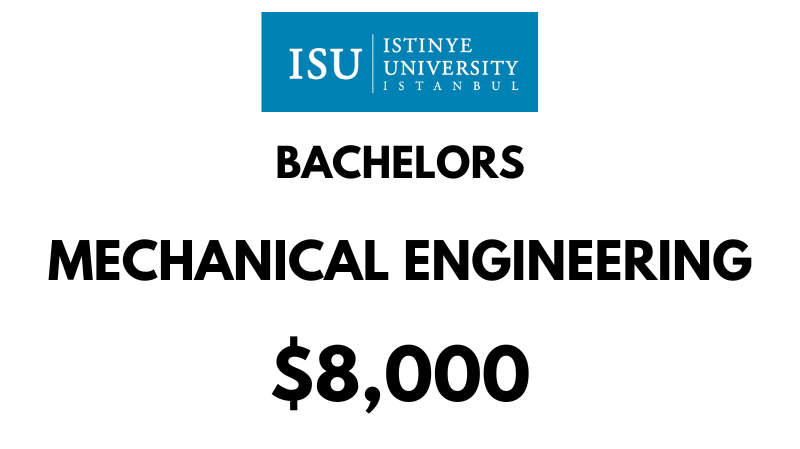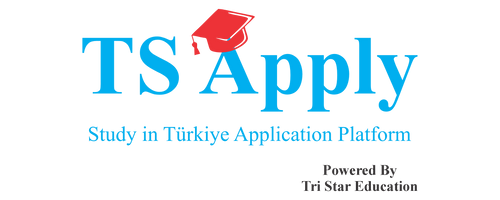
Bachelor of Mechanical Engineering at Istinye University: Tuition Fee: $8,000/year
The vision of the program is to become the focus of today’s technology and engineering by developing innovative, entrepreneurial and competetive R&D projects based on a close collaborative study within all engineering faculties and create benefits and difference in Turkey and its surroundings.
The mission of the program is to conduct international scientific studies that are focused on product development by working interdisciplinary with a competent, young and creative teaching and research staff.
The education within Istinye University Mechanical Engineering Department takes a 4 years of timeline and the education language is entirely in English. The mechanical engineering students start their training with first year’s common engineering courses such as Physics, Mathematics, Computing Languages and Computer Aided Technical Drawing. When the students end up the second year, they learn the main courses of mechanical engineering such as Thermodynamics, Dynamics, Strength and Materials and Manufacturing Methods. In the third year, they are equipped with a robust ability of design and analysis through the elective courses in the areas of the students would like to specialise. In the last education year, they graduate as a mechanical engineer with well-equipped attributes that the industry market looking for after they carry out an industry aimed dissertation project including usually an experimental study, a numerical study and a machine design stages, where they can combine their former knowledge and experiences in the previous years.
As it can be seen below that our department curriculum is based on mechanical engineering departments of the highest ranking universities of Turkey and the world. Unlike classical mechanical engineering curriculums, our course plan includes courses such as Biomechanics, Human Body, Robotics, Electrical & Hybrid Vehicles, Machine Learning and Artificial İntelligence. An intense computational mathematics planning takes place to teach machine learning and artificial intelligence concepts on a roboust fundamental. Students at mechanical engineering department are equipped with programming tools such as Python, Mathematica and MATLAB & Simulink. AutoCAD and SolidWorks, as drawing and modelling tools, are taught as two separate semester courses in mechanical design, as they are essential in many analysis and production processess in mechanical engineering.
Laboratory Facilities
İstinye University Mechanical Engineering Department provides several laboratory facilities within Modelling, Simulation and Extended Reality Lab, Control and Robotics Lab, Mechanics Lab, Strenght of Materials and Measurement Techniques Lab and Manufacturing Systems Lab.
Strenght of Materials and Measurement Techniques Laboratory
Materials and Measurement Laboratory is one of the fundamental laboratories of the mechanical engineering department and extensively used for Materials Science, Strenght of Materials, Statics, Engineering Design, and Machine Design I - II courses. Destructive and non-destructive inspection methods, which is used to determine mechanical properties of materials such as iron, steel, alloys or composites used in manufacturing, biomedical and biomechanical industies, must be experienced by every mechanical engineering students. Also, internal inspection of nano and smart materials are a fundamental educational outcome. In this laboratory, it is aimed for students to experiment and learn tensile and compressive stresses, torsional and bending moments and interpret the material properties such as yield and ultimate stress of these measurements to choose suitable materials. While the mechanical engineer candidates learn to design of machine elements theoretically, these elements and their connection forms are shown in the laboratory environment and the relationship between failure and life of the machine parts is emphasized with Charpy impact and fatigue tests. With the measurement devices in the laboratory, tolerances and exercises used in manufacturing are taught and students can perform calibration by performing error analysis. In addition, the concepts like pressure, temperature, force, moment, flow, which a mechanical engineer will encounter in whatever field he / she works are demonstrated in the materials and measurement laboratory.
The fundamental mechanical and electronic measurement systems that students must have knowledge about are demonstrated in the laboratory environment.
- Rockwell hardness test (Materials Science)
- Vickers hardness test (Materials Science)
- Brinell hardness test (Materials Science)
- Penetrant testing (Materials Science)
- Microscope experiment (Materials Science)
- Hooke's law and spring characteristic experiment (Engineering Design)
- Drive systems experiment (Engineering Design)
- Gear experiments(Engineering Design)
- Strain gauge test (Strenght of Materials)
- Torsional moment test (Strenght of Materials)
- Compression - tension stress test (Strenght of Materials)
- Fatigue test (Machine Design I)
- Charpy impact test (Machine Design II)
- Rijid cismin denge deneyi (Statics)
Manufacturing Systems Laboratory
Manufacturing Laboratory and the Mechanics Laboratory inside it are among the fundamental laboratories. With respect to the curriculum, it will be used extensively for mechanical engineering lectures Computer Aided Design, Fluid Mechanics I-II, Thermodynamics I-II and Mechanical Engineering Student Laboratory.
The first section of the laboratory, "Mechanical Design Workshop" has the tools which may be always needed. These are arc welding device, pillar drill, hand drill, grinding and cutting tools. In the same section, there are also tool cabinets, hexagon working workbenches and several hand tools. The second section is "Computer Integrated Manufacturing" section. Here, the parts designed in SolidWorks CAD software on workstation computers are prototyped with 3D printers. There parts are assembled in conveyor belts with robotic arms, which is controlled by students. Also, there are quality control and storage units in the production line. With using manufacturing optimization and simulation software, the production line is tried to be run the most efficient way. Accordingly, the optimization simulations are validated in the real production line as the last step.
Students who learn SolidWorks CAD software in "Computer Aided Design II" lecture, are able to manufacture the parts that they designed with 3D printers in the laboratories and also conduct analysis on them to make optimization. So that, the CAD (computer aided design) concept will be upgraded to CAM (computer aided manufacturing) and CAE (computer aided engineering).
- Virtual production optimization
- Assembly in production line
- 3D printing and simulation optimization on CAD software
- Machining and forming experiments
- Welding and soldering experiments
Mechanics Laboratory
In this section, Fluid Mechanics, Thermodynamics, Internal Combustion Engines, Vibration and Acoustics experiments are conducted in scope of "Mechanical Engineering Student Laboratory" lecture. There is a 3-cylinder diesel engine in the lab for mechanics and thermodynamics experiments.
- Fluid mechanics experiments
- Thermodynamics experiments
- Internal combustion engine experiments
- Vibration and acoustics experiments
-
These tools are available in the workbenches and toolboxes in the mechanical laboratory:
- Allen set (Torx and hexagon)
- Sprays (Liquid grease oil, rust cleaner, silicone)
- Hand cleaning solution
- Adhesives (Liquid gasket ,fast glue kit, manual silicone gun)
- Lever
- Matte black paint
- Soldered cable end
- Zip tie
- Soldering pen
- O-ring set
- LED lamp
- Plate sander, metal brush
- Grinding wheel, cutting wheel, flap disc
- Utility knife, electric tape, double-sided tape
- Earmuffs, safety googles, safety gloves
- Hand saw
- Cool melt wax gun
- Welding machine and accessories
- Feeler gauge set
- Tape measure, test pencil, digital multimeter, mechanical and digital caliper, digital micrometer, torque wrench
- Funnel
- Spatula and tweezers set
- Torx, phillips, flat, socket and electrician screwdriver sets
- Insulated pliers, adjustable pliers, wrench, pipe wrench
- Spark plug socket, piston ring
- Pliers (Lineman's, parrot, side chisel, circlip, hose clamp)
- Locking bar clamp
- Key sets
- Hammers (wooden handle and plastic)
- Brush set, file set, punch set
- Magnetic grabber
- Pullers
- Jack
- Lubricator
- Rivet gun and nut set
- Column drill and hand drill
- Spirit level
- Grinding and cutting machine
- Extension cables
- Bits and drill bit sets
- Hook-scraper set
- Cordless screwdriver
